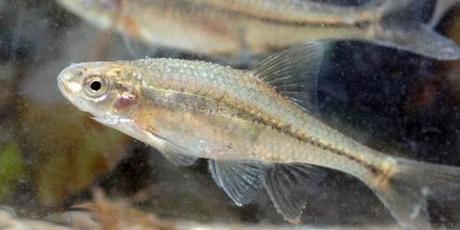
Image from http://www.huffingtonpost.com
The Oregonichthys crameri, or the Oregon chub is native to western Oregon. It is a tiny silver-colored fish that can fit in the palm of your hand, and it has a very specific habitat. The Oregon chub prefers waters with little or no flow such as beaver ponds and marshes. For the last one hundred years, the chub has been facing a serious reduction in numbers. The two main causes are altered habitat from both human and natural interference and the introduction to non-native and invasive species of fish.
In 1993, The Oregon chub was given protection under the Endangered Species Act and listed as an endangered species. Since then, serious recovery and conservation efforts have been implemented by partnership of the Oregon Department of Fish and Wildlife, the Army Corps of Engineers, private landowners, and other groups in order to save this fish. In 2010, their efforts proved fruitful as the Oregon chub’s status was downgraded from endangered to threatened.
In late January, a proposal was made to remove the Oregon chub from the endangered species list entirely. The fish had recovered significantly in the past few years and population levels were no longer considered dangerously low. At the time of its listing as an endangered species, there were fewer than 10 known populations of the fish. Today, the number of chub populations is up to 80 different population locations in different habitats.
Part of the reason for the chub’s recovery is the awareness of the people and their willingness to help in the conservation effort. The Army Corps of Engineers gave resources and manpower to help monitor and manage the chub populations. Private land owners did their share as well by introducing the Oregon chub on their property and then maintaining that population and the environment it needed to survive. If the Oregon chub were to be removed from the endangered species list, it would be the first fish to ever be removed due to recovery.

